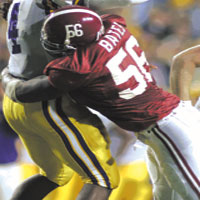NCAA News Archive - 2006
« back to 2006 | Back to NCAA News Archive Index
After failing 2003 test, former Alabama player dedicated himself to elevating awareness
|
The NCAA News
Todd Bates’ worst day came several months after his positive test in 2003 for ephedra — and several weeks after appealing unsuccessfully that he didn’t know a dietary supplement contained the banned substance.
"It didn’t really set in until it was time for the team to go and play the first game. They call out the traveling squad that’s going to stay at the hotel," said Bates, who was set to move into a starting role on the Crimson Tide defense for the 2003 season. "I remember it like it was yesterday. My coach, he’s like, ‘Man, I know it hurts.’ I had tears in my eyes when they called out the travel squad."
From that moment on, though, Bates began to look at his situation differently.
"I used that time. I got so much stronger the natural way, just busting my butt and working hard," he said. "And I became a stronger individual during that time. It really helped the way I look at adverse times, when things aren’t going right. And in the long run, it made me a better football player, and a better person."
Unfortunately, Bates’ response isn’t necessarily the norm among student-athletes who test positive in the NCAA program.
"I can tell you how it’s supposed to be in a perfect world: The threat of drug testing is so significant that an athlete makes the decision not to use," said Frank Uryasz, who as an NCAA staff member directed the Association’s drug-testing program before founding the National Center for Drug Free Sport, Inc., in 1999. "And ideally, when college students make mistakes, they learn from it, they restore their eligibility a year later, and they go on and finish their eligibility, get their degree and learn from the whole experience.
"We know that’s not how it works all the time, and that’s frustrating at times, because, No. 1, there are athletes who test positive and they never restore their eligibility, and you wonder what happened to them. There are other cases where we’ve had athletes who have tested positive after their first positive test. We’ve even had cases where they’ve tested positive in their exit drug test — the test their school asked for to re-establish eligibility."
Bates found comfort in the reactions of teammates, opposing players and fans.
"It was just one of those things — maybe I was just meant to help out other guys," he recently said in Nashville, Tennessee, where he works for the city’s parks and recreation department as a coordinator of youth mentoring programs. "There were other guys on the team (using the same supplement) who didn’t know (it contained ephedra). Ignorance is no excuse, but they didn’t know it. It would have been really tragic for one of them to lose their senior season."
Bates also recalls that the Alabama athletics department — whose coaching and training staffs did not know about his use of the supplement — took signficant steps to warn other student-athletes away from use of banned substances.
"I noticed a difference right after I failed the drug test in the way we conducted meetings, as far as what’s banned, what’s good for you and what’s not. We had more frequent meetings about that than I’d seen during my first two years, ‘just making sure guys were aware... .’
"I think most schools that knew the story began to do the same thing — educate their players about stuff more often."
Bates returned for his senior year, played in the Music City Bowl, then signed a free-agent contract with the Tennessee Titans. A broken hand led a few months later to his release, and subsequent efforts to play professionally also have been frustrated by injuries, including a recurrence of the sports hernia that led to his use of the dietary supplement.
He continues to work toward a professional career, but meanwhile is enjoying his experience with Nashville youths, who he says "tripped out when they found out I used to play for the Titans — they were just all going crazy."
When he asks the youngsters what they want to do when they grow up, some say they want to do what’s he’s doing — work with children.
"Who knows what God has for me, as far as professional football. But I’m enjoying what I’m doing with the kids."
© 2010 The National Collegiate Athletic Association
Terms and Conditions | Privacy Policy

